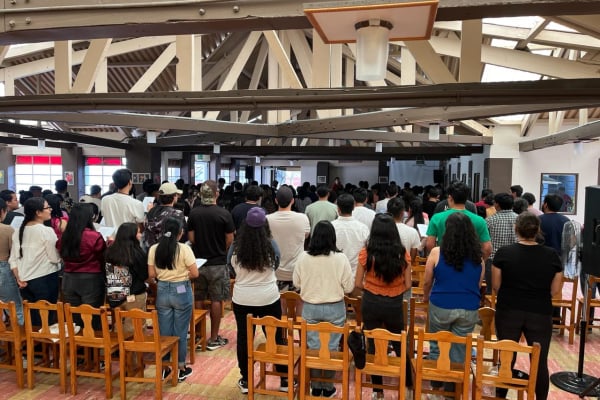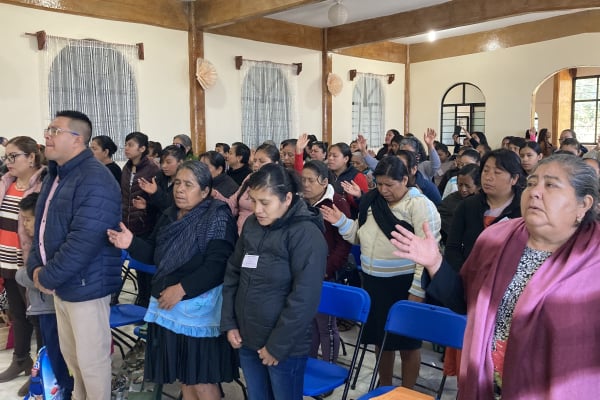From Student to Teacher: A Question
As teachers we're accustomed to answering questions. Some questions make us think, others make us laugh, yet others cause frustration because it reveals a student wasn't paying attention to the information previously given.
Once in awhile, a question is unexpected and difficult to answer. Recently, one of our students, Sara Samantha, asked me one such question. Sara, age 13, began attending our school last year and heard the gospel message for the very first time. Having an analytical mind, she asked many questions and was careful to observe this new-to-her truth in both the Bible and the lives of the other students and teachers. She eventually trusted in Christ as her Savior. This year, she and her family began attending the church plant with which we've been helping. Her parents and little brother haven't yet trusted in Christ, but they have been attending services faithfully and have been seriously considering the gospel message.
"Mr. McManus, a year ago one of my aunts died. Now, the family [which is devoted to traditional Catholicism] will be meeting in my aunt's old home and praying to the Virgin for her salvation. These prayers last for a couple hours. I don't want to pray because it is useless to pray for the dead and because I don't pray to the Virgin any longer. However, if I don't say these prayers, my grandmother will get very angry with me and become abusive towards me because she always does when I don't do the Catholic things I was taught growing up. What should I do?"
In this case, the correct answer itself isn't so difficult, but knowing that doing the right thing will likely offend at least some of her relatives and will probably incur the wrath of her grandmother (who has a history of reacting angrily to Sara and her family for "abandoning the Catholic faith") is not an answer given nonchalantly. Nonetheless, holding to the truth is still the way to honor and obey God regardless of the consequences.
I asked her what her parents were going to do. She thought her dad would stay inside their car and not go into the house. Her mother was planning to go in and join in the prayers.
I asked her what she thought she should do. She said, "I don't think I should, but I'm afraid not to, and I don't know if it's OK to offend my relatives by not doing what they want."
I asked her, "so if I tell you that you should refuse to pray, and then things go poorly for you, it will be my fault, right?" She smiled and replied, "No, no. I wouldn't blame you. I just want to do the right thing."
So, here is the question: what should Sara do?
- Her parents are not requiring her to pray, so there is no parental obedience/disobedience to consider in this scenario.
- Sara understands that she should not be praying to anyone other than God.
- Sara understands that the Virgin Mary is not God.
- Sara understands that praying for the dead is pointless since their opportunity to decide to follow Christ through faith has passed now that the person has passed from life to death; as it says in Hebrews 9:27 (ESV), "And just as it is appointed for man to die once, and after that comes judgment...."
- Sara understands that believers must obey God rather than man, so that even if it causes offense, obedience to God is truly her only choice. Just like the Apostles who were preaching the gospel in public and were forbidden to do so by their Jewish leaders in Acts 5:29 (ESV), "But Peter and the apostles answered, 'We must obey God rather than men.'"
Sara's decision was made to not pray. So, we prayed and asked God to give her strength to do the right thing even if it was painful and for God to somehow make the situation turn out better than expected.
Anxiously, I awaited the following day to ask Sara how it went.
Another question: Do you believe that God answers prayer?
Sara smiled the following day when I asked her how it went. She said, "On our way to the vigil, there was some sort of problem on the road which caused us to arrive about 30 minutes late. My mother [after discussing the situation as a family during the traffic delay] decided she would not pray, and she didn't. She agreed and said, 'Yes, what good would it do to pray for my sister now? She's already dead.'"
So, neither of Sara's parents prayed. Sara stayed in the car for most of the time. Sara's mother went inside but didn't not pray. Given none of them prayed and were united in that decision, the grandmother, surprisingly, didn't get angry and yell at them or mistreat Sara!
Praise God for providing His word for wisdom and direction, and praise Him for answering our prayers!











.png)



